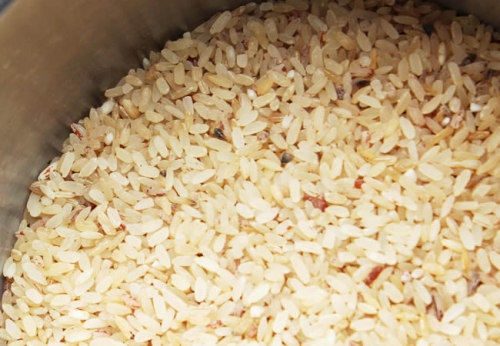News And PoliticsArts And EducationCommunications And EntertainmentHealth And LifestyleSports And FitnessLawRelationship And MarriageMotivationalsVehicles And MobilityOthersFood And KitchenBusiness And MoneyScience And TechnologyReligion And PrinciplesStories And PoemsUSMLE And MedicalsFamily And Holidays
profile/2277IMG_20200116_052733_5.jpg
Fidelity

Why Nigerian Homegrown Rice Is Poor.
~2.8 mins read
Processing agricultural products – adding value by transforming them from basic commodities – increases their worth, appeal and market value. In the case of rice, processing is an important and distinct feature in its production. It involves changing harvested paddy into edible rice.
Nigeria’s rice processing techniques are inefficient. This has resulted in processed rice that’s too expensive and of a lower quality than rice from other countries like China, Vietnam and India.
Rice, one of the major staple foods in Nigeria, is consumed across all Nigerian socioeconomic classes. Still, only about 57% of the 6.7 million metric tonnes of rice consumed in Nigeria annually are locally produced. This leads to a supply deficit of about three million metric tonnes, which is imported.
Over 80% of locally produced rice comes from small scale processors with a processing capacity of less than 100 tonnes. And these small scale processors are faced with financial challenges that inform their choice of equipment. Large scale processors, on the other hand, constitute less than 20% of processors. They face the challenge of inconsistency in grain quality and insufficient paddy. Both small scale or cottage rice processors and large scale processors depend on paddy from farm lands or purchase from neighbouring villages or towns.
The processing procedure entails parboiling raw rice to soften the husk, drying and milling it before selling to distributors or retailers. After milling, small stones must be removed using a de-stoner. De-stoning rice makes locally processed rice more appealing. But the majority of the small scale processors cannot afford this equipment unless they form themselves into co-operatives to purchase one.
We conducted research
Choice of processing techniques among rice processors in Nigeria | Eme…
Rice processing, an important feature in rice production involving the transformation of harvested paddy into ed…
to establish why Nigeria’s processed rice was of low quality. We wanted to establish what drove the decisions of Nigerian rice processors, specifically their choice of the techniques for the processing of rice.
We found out that, in many instances, Nigerian rice processors, especially the small scale or cottage processors, do not have adequate processing capacity. We discovered that the choice of techniques and equipment used during processing was a major determinant of output and quality. The choices rice processors made were driven by a host of factors. These included budgetary constraints, social and economic factors as well as processing constraints.
In a bid to identify the factors affecting rice processors’ decisions, we administered structured questionnaires to 410 rice processors selected from four states – Ebonyi, Ekiti, Ogun and Nasarawa – from three geopolitical zones in Nigeria – South-East, South-West and North-Central. We asked them about processing. We wanted to know about their experiences, where they sourced their raw rice, their processing activities and techniques, if they had available credit to enhance their processing activities and the distance covered from farm to processing centre and from processing centre to the market.
The responses to the questions showed that choices were dependent on each processor’s finances and a number of social and processing characteristics. These included the age (youth or elderly), sex, education, marital status and household size of processors. Economic factors also played a role, including access to a loan to buy modern equipment, and the size of the processing operation. Even if they could afford new equipment, most didn’t have the capacity to service it.
Consequently, there were instances where processors formed themselves into co-operatives in a bid to access loans and other financial aid from the government with the aim of purchasing processing equipment. But the time lag for loan applications delayed productive activities. The outcome was many processors became discouraged, and abandoned trying to use new processing techniques and equipment. There were also instances where processors couldn’t get spare parts and de-stoning machines required to sift raw rice.
Organised markets in the country present obstacles too. They opted for parboiled imported rice from countries like Vietnam, Indonesia, China and India instead of locally processed rice. This is because to process a 50 kilogramme bag of rice locally is more expensive and not economical.
profile/2277IMG_20200116_052733_5.jpg
Fidelity

No I Don't Know How To Cook, I Can Only Boil Water
~2.2 mins read
I don’t have the time to do that because of work. Therefore, my wife handles that aspect. I don’t know how often she does that.
Do you take note of the nutritional value of the things you eat?
My wife knows all about food and it is her duty to take not of that. She makes sure she gives me the best of what I need to eat. I do not take note on my own (of the nutritional value), but my wife does it for me.
Do you know how to cook?
No, I don’t know how to cook. I can only boil water. There was only a time I tried to cook, but my wife eventually did that for me. I told her how I wanted the soup to be made and the ingredients I wanted in it. I call it Ibu stew.
Do you like spicy food?
No, I do not really like it. Also, I’m scared of food that has certain types of flavours.
Advertisement

Link socials
Matches
Loading...
